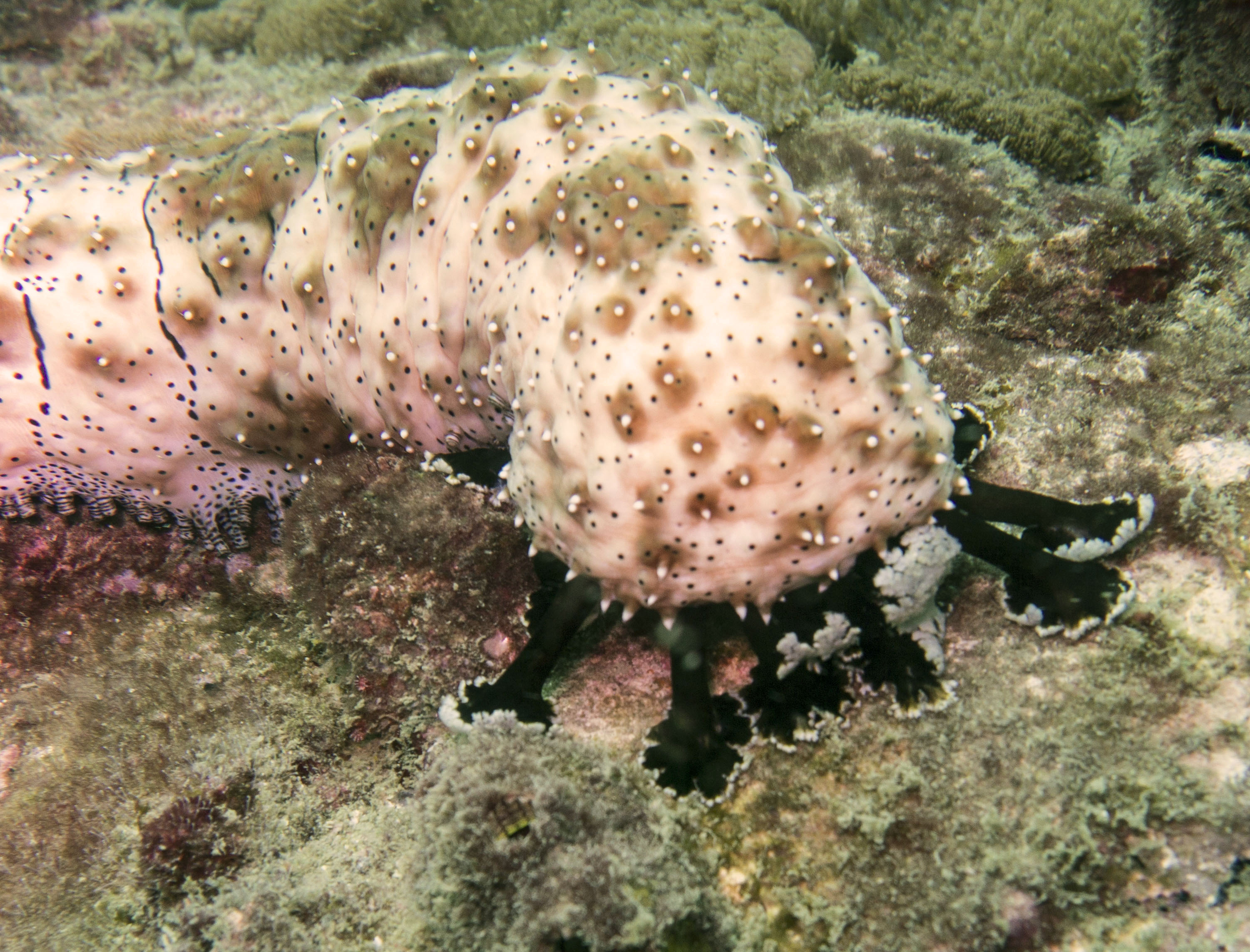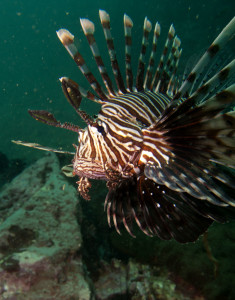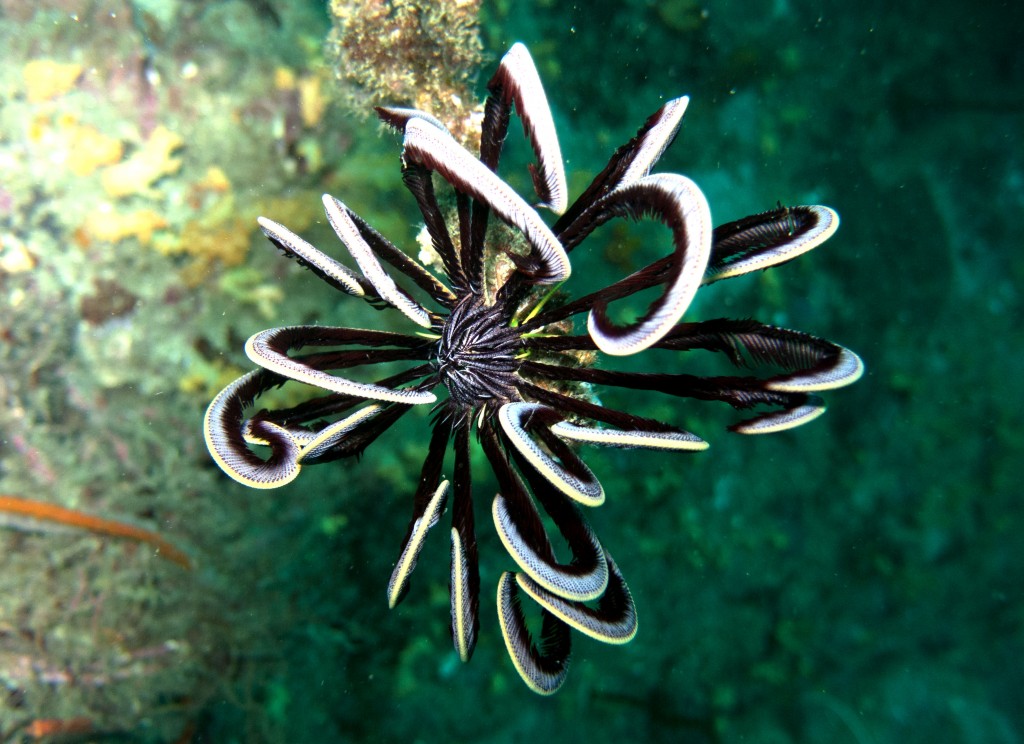News
Diving the Mergui Archipelago

In February 2014 I traveled alone to Thailand and went diving in the Andaman Sea for 7 days on a liveaboard. The Deep Andaman Queen is not a luxury dive boat, but the cabins were clean and air conditioned (a necessity in the heat). There was always plenty of food at all meals, and the crew was exceptional. The dive masters were excellent as well. I give the boat itself a C plus, but the crew and dive masters receive an A plus! As we all know, service and safety is more important than 5 star meals and cabins (though I love the boats that pamper you). The dive platform was large and ample as well. I journaled each day and eventually turned my entries into blogs. Here is one of my journal entries about the Mergui Archipelago in Myanmar (formerly Burma):
It is beautiful here, but to be blunt, the diving is less than great. The visibility is poor to fair, and we’ve seen nothing major to report, except for a sea snake (my first sea snake!!!). If I was seeing large pelagics, as in the Revillagigadoes Islands in Mexico, I wouldn’t mind the conditions, but when there isn’t much to see except coral (which is gorgeous) it is a bit disappointing. You know how desperate I am for animals when I take several photos of sea cucumbers! Of course, these sea cucumbers are really incredible. I’ve never seen sea cucumbers walking around on a million legs before.
As in so many other places around the world, we are at odds with fishing boats. It may be illegal, but there is dynamite fishing going on here, and you can see the “rubbish” and “rubble” it brings up from the bottom. The dive sites definitely show signs of having been fished in this manner. Longtail fishing boats are everywhere and most of the dive sites have had at least one boat hanging around, ready to dynamite it for fish. It is distressing to see.
 I saw two small blue spotted rays. Except for the sea snake, that’s about as exciting as it got. If you think there are a lot of sharks in the Andaman, you would be dead wrong. The water is nutrient rich here, huge numbers of small fish, unbelievable numbers of schools of silversides and glassy sweepers and chevron barracuda, but the question is: where are the predators and the pelagics? Nary a one. No turtles, dolphins, sharks, mantas, only the two small rays, and nudibranchs. I do love the tree coral and the feather stars! They are fascinating. I also like the huge schools of fish, but I long to see something a bit bigger.
I saw two small blue spotted rays. Except for the sea snake, that’s about as exciting as it got. If you think there are a lot of sharks in the Andaman, you would be dead wrong. The water is nutrient rich here, huge numbers of small fish, unbelievable numbers of schools of silversides and glassy sweepers and chevron barracuda, but the question is: where are the predators and the pelagics? Nary a one. No turtles, dolphins, sharks, mantas, only the two small rays, and nudibranchs. I do love the tree coral and the feather stars! They are fascinating. I also like the huge schools of fish, but I long to see something a bit bigger.
Due to the water conditions we are not going to Black Rock, supposedly the best dive site in the area. The description speaks of whitetip and blacktip sharks, and majestic mantas and whale sharks. I was so looking forward to see Black Rock, but the ship captain knows best, and it just isn’t going to happen.
I’ve enjoyed my dive buddies, the “boys”. Most passengers are couples, or in a dive group from Spain, so I’m hanging with Chris, the American wild and crazy guy, the Finn twins, and Mauro, from Italy but living in Finland. I seem to always hang out with the guys. So far, I haven’t run into another woman traveling and diving alone. Next to the actual diving I love meeting the divers, and being part of a group of people who love to dive as much as I do.
For more from Tam, visit www.travelswithtam.com.
Gear News
Introducing the TR-80, IR-50 and CS-30 Regulators from DYNAMICNORD

Whether you are a beginner or a professional diver – with the three new main regulators from DYNAMICNORD, everyone will find their favourite regulator. They all look super stylish.
Excellent performance with the TR-80
Quality and performance are the be-all and end-all for regulators. It is not for nothing that the TR stands for Tec Reg. The innovative design of the TR-80 guarantees absolute reliability – even in ice-cold waters.

Perfect breathing effort at 0.8 J/l / certified for diving in waters below 10 degrees / structural design made of solid brass for best cold protection / membrane-compensated design with dry seal of the first stage / reduced exhalation effort thanks to optimized exhalation membrane and bubble deflector / adjustable Venturi (dive/predive) and adjustment knob for individual inhalation comfort / innovative design of the front cover prevents free-flow in strong currents or when diving with scooters / design made of sandblasted brass, matt chrome finish / 2 HP and 4 LP outlets / mouthpiece made of high-quality, anti-allergic silicone for maximum comfort.


Amazing underwater adventures with the IR-50
The IR-50 is the top regulator for advanced and experienced divers. Natural breathing is the essence of this regulator.

Ideal breathing effort at 0.8 J/l /certified for diving in waters below 10 degrees / compensated membrane / adjustable venturi (dive/predive) and adjustment knob for individual inhalation comfort/ outlet valve and deflector for minimum exhalation effort and reduction of bubbles on the face / design made of sandblasted brass, matt chrome finish / 2 HP and 4 NP outlets / mouthpiece made of high-quality, anti-allergic silicone for maximum comfort.


The Workhorse – our CS-30
For diving centres and diving beginners – the workhorse stands for strong construction, reliability and robustness. Perfect for your training.

Optimal breathing effort at 0.8 J/l /recommended for diving in waters above 10 degrees / non-compensated piston / adjustable venturi (dive/predive) / outlet valve and deflector for minimum exhalation effort and reduction of bubbles on the face / design made of sandblasted brass, matt chrome finish / 1 HP and 3 NP outlets / mouthpiece made of high-quality, anti-allergic silicone for maximum comfort.


Octopus OP-30
The OP-30 is the ideal addition to all DYNAMICNORD regulators. It is identical in construction to the CS-30.

The TR-80, IR-50, CS-30 (DIN & INT) regulators and the Octopus OP-30 are available from DYNAMICNORD dealers and in the online store.
DYNAMICNORD – Your Outdoor Companion.
Marine Life & Conservation
Paul Watson Released as Denmark Blocks Japan’s Extradition Bid

Renowned anti-whaling activist Paul Watson has been released from custody in Greenland after spending five months in detention. Denmark’s Justice Ministry rejected Japan’s request for his extradition, citing insufficient guarantees that his time already served in custody would be credited against any potential sentence.
The 74-year-old Canadian-American was arrested on July 21 in Nuuk, Greenland’s capital, when his ship docked to refuel. His arrest was based on a 2012 Japanese warrant related to a 2010 encounter in Antarctic waters. Japan alleged Watson obstructed operations and caused damage to a whaling research ship during efforts to disrupt illegal whaling. Watson has consistently denied these claims, maintaining his commitment to marine conservation.
Denmark, which oversees extradition matters for Greenland, concluded that while the legal conditions for extradition were met, the lack of assurances from Japan regarding time-served credit made extradition untenable.
In a video shared by his foundation, Watson expressed gratitude and relief, saying, “After five months, it’s good to be out… and good to know they’re not sending me to Japan.” He added that the most difficult part of his time in custody was being separated from his two young sons.
Watson is a pioneering figure in marine conservation, known for founding the Captain Paul Watson Foundation in 2022 after decades of activism with the Sea Shepherd Conservation Society. His bold efforts to defend marine life have earned him widespread support, including from celebrities and conservationists. His work has also been featured in the acclaimed reality TV series Whale Wars.
Watson’s lawyer, Jonas Christoffersen, praised the decision, stating, “We are happy and relieved that Paul Watson is now free.” He added that Watson is eager to reunite with his family and continue his vital work.
The arrest occurred while Watson’s vessel, the M/Y John Paul DeJoria, was en route to the North Pacific with a team of 26 volunteers to intercept a Japanese whaling ship. His foundation described the arrest as politically motivated and emphasized that Watson’s actions were focused on ending illegal whaling practices.
Japan resumed commercial whaling in 2019 after leaving the International Whaling Commission, asserting that whale meat is a cultural tradition. Conservationists, however, continue to challenge these practices, highlighting their impact on marine ecosystems.
Despite the challenges, Watson remains steadfast in his mission to protect marine life and bring attention to whaling practices. His dedication to ocean conservation has made him a globally respected advocate for the environment.
-

 News2 months ago
News2 months agoIconic SS United States to become the World’s Largest Artificial Reef
-

 News3 months ago
News3 months agoBook Review – 52 Assignments: Underwater Photography
-

 Gear News3 months ago
Gear News3 months agoDYNAMICNORD – New German diving brand enters the British market
-

 News3 months ago
News3 months agoExploring Cenote El Pit: A Diver’s Dream
-

 Gear News3 months ago
Gear News3 months agoTry BARE drysuits (and maybe even win one!) this Friday with Sea & Sea at North West Dive Fest
-

 Marine Life & Conservation3 months ago
Marine Life & Conservation3 months agoBook Review: Coral Triangle Cameos
-

 Blogs3 months ago
Blogs3 months agoDive the Egyptian Red Sea this Autumn with Regaldive
-

 News3 months ago
News3 months ago2024 Ocean Art Underwater Photo Competition Announced
















